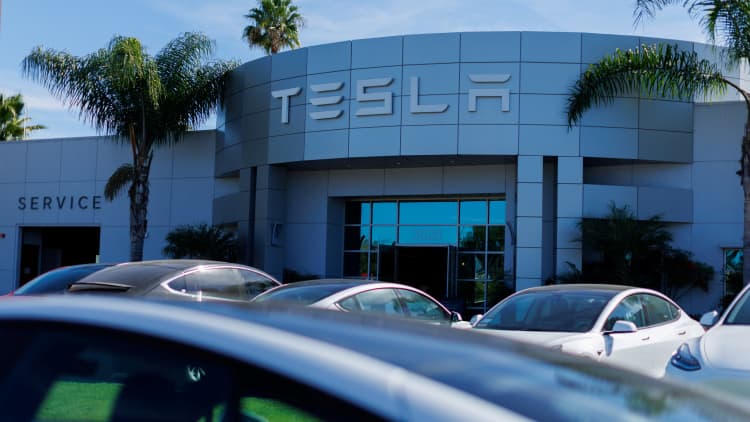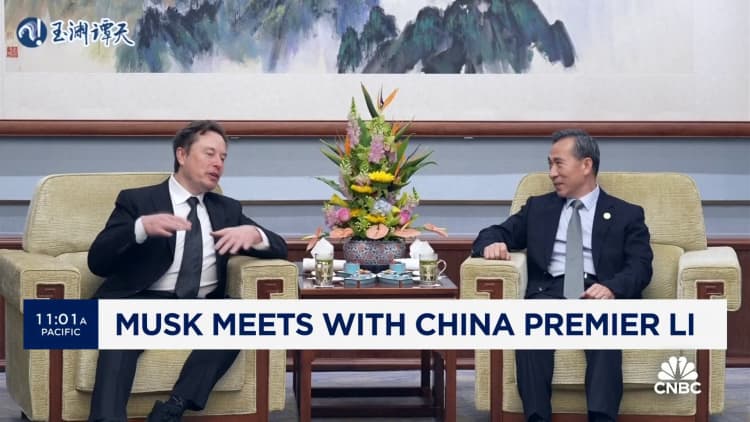
The Chinese new energy vehicle giant showcased its latest version of the Han electric sedan at the Beijing Auto Show on April 26, 2024.
CNBC | Evelyn Cheng
BEIJING — Chinese automakers, including state-run auto giant Guangzhou Automobile Group, cannot afford to take China’s electric vehicle boom lightly if they want to survive.
China’s battery and hybrid car adoption surges, but onslaught of new models sparks price war that forces Tesla Also lower its price. While Chinese automakers are also looking to grow overseas, other countries are increasingly concerned about the impact of cars on their domestic auto industries and the need to invest in local production. In China’s already fiercely competitive electric vehicle market, it’s now a matter of survival of the fittest.
“The pace of elimination will only accelerate,” Feng Xingya, general manager of GAC Group, told reporters on the sidelines of the Beijing Auto Show in late April. That’s according to CNBC’s translation of his Mandarin remarks.
GAC Group significantly cut vehicle prices in the week before China’s May 1 Labor Day holiday, Feng said, noting that the price war contributed to its first-quarter sales decline. According to Wind information, the automaker’s operating income fell annually in the first quarter for the first time since 2020.
Feng said that in order to remain competitive, GAC Group is cooperating with technology companies such as Huawei while focusing on internal research and development. The automaker is a joint venture partner of Honda and Toyota in China and owns an electric vehicle brand called Aion.

“In the short term, if your product is not good, consumers won’t buy it,” Feng said. “You need to use the best technology and the best products to meet the needs of consumers. In the long run, you must have core competitive advantages.”
Expanding beyond China
Like other Chinese automakers, GAC is looking overseas. According to data from the China Passenger Car Association, as of March, domestic sales growth of new energy vehicles (including pure electric vehicles and hybrid vehicles) has slowed down compared with December.
Wei Haigang, general manager of GAC International Automobile Sales and Service Business, said in an interview with CNBC last week that last year, GAC Group adjusted its overseas strategy, with the ultimate goal of selling 1 million vehicles overseas – electric, hybrid and fuel-powered vehicles.
The company still has a long way to go. Wei said it exported only about 50,000 vehicles last year. But he said the goal this year was to double the number to at least 100,000 vehicles and reach 500,000 by 2030, and to develop sales targets and strategies for different regions of the world, starting with the Middle East and Mexico.
“We are now going all out to accelerate overseas expansion,” he said in Mandarin (CNBC translation).
China’s overseas automobile sales grew significantly last year, ranking first in the world with Japan The largest automobile exporting country. Last year, the European Union and the United States announced investigations into Chinese-made electric vehicles in an effort to encourage consumers to abandon gas-powered vehicles.
Factory goes global
Part of GAC International’s strategy is to localize production, Wei said, noting that the company is using various methods including joint ventures and technology cooperation. GAC opened a factory in Malaysia in April and plans to open another in Thailand in June, with Egypt, Brazil and Turkey also under consideration, he said.
Wei said GAC plans to set up eight subsidiaries this year, including in Amsterdam. But he said the United States was not part of the company’s recent overseas expansion plans.
The difference today is that overcapacity is combined with extremely competitive vehicles
Stephen Dale
AlixPartners Co-Head of Greater China Business
U.S. and European officials have stressed in recent months the need to address China’s “overcapacity” can be broadly defined as state-supported production of goods exceeding demand. China has refuted such concerns, with its Ministry of Commerce claiming that from a global perspective, new energy is facing a capacity shortage.
“The Chinese auto industry has always had overcapacity,” said Stephen Dyer, co-head of consulting firm AlixPartners’ Greater China practice and head of the company’s automotive and industrial business in Asia.
“What’s different today is overcapacity combined with very competitive vehicles,” he told CNBC on the sidelines of the auto show. “So in our electric vehicle survey, I was surprised to find that about 73% of U.S. Consumers will recognize at least one Chinese electric car brand, followed closely by Europe.”
Dell expects this to drive overseas demand for Chinese electric vehicles. AlixPartners findings BYD Has the highest brand awareness in the United States and major European countries, followed by Nioh and zero sports car.
BYD exported 242,000 vehicles last year and is also building factories overseas. The company’s sales are broadly divided into hybrid vehicles and battery-powered vehicles. BYD no longer sells traditional fuel-powered passenger cars.
technology competition
In addition to price, this year’s Beijing auto show also reflects how Chinese and foreign companies compete in technology areas such as driver assistance software.
Citing a survey by AlixPartners, Dell said Chinese consumers value technology functions almost twice as much as American consumers.
He noted that Chinese startups are so aggressive that cars may be sold with the new technology even if the software still has problems. “They know they can use over-the-air updates to quickly fix bugs or add features as needed,” Dell said.
Interest in technology doesn’t mean consumers will buy battery-only cars. Dell said that in the short term, consumers remain concerned about driving range, which means hybrids are not only in demand but are often used without charging.

even Volkswagen Joining the “Smart Technology” competition. The German auto giant revealed at the auto show that its joint venture with Shanghai state-owned SAIC Motor is working with the automotive arm of Chinese drone company DJI to develop driver assistance systems for cars. The newly launched Tiguan L Pro.
According to CNBC’s Chinese translation, the initial version of the SUV will be fuel-powered, and the company’s slogan is: “Petroleum or electric, both are smart.”
battery manufacturer Ningde era Zhong Shi, an analyst with the China Automobile Dealers Association, said the booths were more prominent this year, possibly in the hope of encouraging consumers to buy battery-equipped cars as competitors gain market share.
Automotive chip companies Black Sesame and Horizon Robotics also have booths in the main exhibition hall.
what customers want
This was stated by Chief Financial Officer Alexious Kuen Long Lee in an interview with CNBC on the sidelines of the Beijing Auto Show. He noted that the company now has robotic battery chargers in Shanghai.
Lotus and Nio also announced last week strategic partnership About battery replacement and charging.
“I think the baton is being passed, and Chinese brands are getting bigger and stronger, while foreign brands are still trying to decide what is the best energy route,” said Li, who has worked in China since 1998. Are they still deciding on plug-in hybrids, are they still considering pure electric vehicles, are they still considering internal combustion vehicles? Effectiveness.
But he thinks Lotus has found the right strategy by expanding its product line and moving directly to battery-powered cars. “Lotus today,” he said, “is similar to the position of international brands in China, probably in 2000.”







